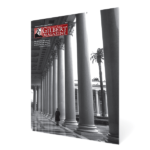Illustrated London News 1929-31
Volume 35 of the Collected Works of G.K. Chesterton
As we grow older, we may or may not grow wiser, but we often grow more cynical. G.K. Chesterton was wise early on, and as he grew older, he simply found that his early intuitive wisdom was confirmed by experience: “The advantage of advancing years lies in discovering that traditions are true, and therefore alive; indeed, a tradition is not even traditional except when it is alive. It is great fun to find out that the world has not repeated proverbs because they are proverbial, but because they are practical.”
His confirmed wisdom did not make him grow cynical. On the contrary, he grew more romantic. The beauty of his outlook is reflected in his prose during this time period, which is perhaps why nearly all of his Illustrated London News essays from 1929 to 1931 were collected into books (Come to Think of It, All is Grist, All I Survey). They are captivating, as anything beautiful is.
In this three-year run, he discusses how modern philosophy has taken the life out of modern literature, how materialism has been substituted for science, how history might have been, how the new religion that is always predicted to come, doesn’t.
Also included are more observations on America, since these columns were written during his second tour of the U.S. “The American error,” he says, is “the notion that optimism is the same as idealism.”
In his very early career, Chesterton called himself an optimist, which he took to mean “the primary conviction that life is worth living and the world is worthy of our efforts for it.” But later he sees that optimism has come to mean “a cheap cheeriness” based on “a hollow belief in reality.”
Chesterton’s firm grip on reality, however, is not to be confused with realism, which is a false version of reality. Rather than an optimist, Chesterton now characterizes himself as a Romantic, which he defines as:
The belief that the simplified and symbolic version of life, which depicts it, under the image of love and war, as a quest with a prize (especially a princess), is nevertheless a true version of life; that is an
a legitimate simplification. St. George must kill the Dragon, or the Dragon will kill the princess; that seems to me a truer picture of the aim of life and the lot of man than any realistic novel. That may
fairly be called Romanticism; but it is almost the exact opposite of what the Humanists and the New Classicists mean by Romanticism. They mean the notion, not that St. George must kill the dragon, but
that St. George may get drunk and dream about dragons; or that, if he drinks enough, he may look forward to seeing even larger snakes. This sort of sodden subjective delusion is what they mean by Romanticism, and in that sense all they say of it is both practical and profound. And yet I think I could make a case for my own use of the word being the correct one.
He observes that those who break away from romance end up breaking away from reason, from a respect for human dignity and a right understanding of things. “Realism, when entirely emptied of romance, becomes utterly unreal. For romance was only the name given to a love of life . . .”
Chesterton says that realism may have a certain “bravado” to it, but the result is always “the loss of reality.” It is not a triumph of truth, but “a triumph of deception.” Realism does not satisfy. Only the truth satisfies.
And so Chesterton continues his romantic battle against error because he is trying to protect something beautiful.
In order to suppress false doctrine, we must have a definition of true doctrine. And very few people now know exactly what doctrine is true, even if they feel a great many current ones are false. … it is, after all, a moral doctrine which declares that mere appeals to mere appetites are wrong. It is a moral doctrine most decent people vaguely feel, but now a little too vaguely to be applied vigilantly. … They do emphatically involve immortal and unalterable truth. The fact that a chaotic and ill-educated time cannot clearly grasp that truth does not alter the fact that it always will be the truth.
Our “chaotic and ill-educated time” is not concerned with dogmas, but with diet, “or rather with the idea of forcibly interfering with the diet of other people.” It suffers from “the journalistic curse” of being obsessed with the latest news, which means only hearing the end of the story without having heard the beginning of it. It rejects tradition because it is old. It assumes religion is not “up to date.” It cuts itself off from the past, claiming to teach by experiment, but refusing to learn by experience.
Chesterton the Romantic still insists that all truth is connected to one truth, that all beautiful images are shadows of the one real beauty, that each of our creations should reflect the glory of God’s creation. And so he invokes St. Francis, “the patron of all birds, poets, and other minor nuisances.”
For the modern world, Chesterton the Romantic is dismissed as a dreamer. Never mind that he keeps being proved right as a prophet. But Chesterton perhaps prefers to be known as a dreamer rather than as a prophet. After all, he says, “Men are judged by their dreams.”

